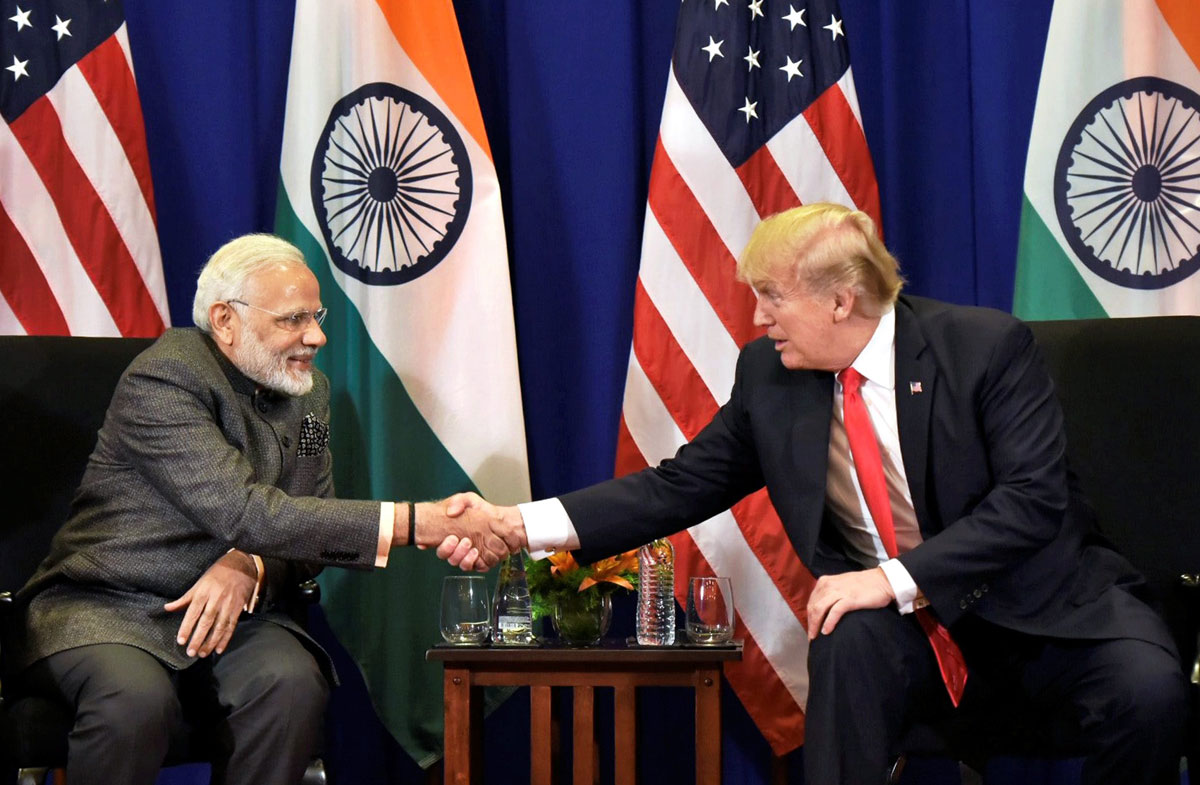Congress Passes $700 Billion Defense Bill
Indian Prime Minister Narendra Modi meeting the President Donald Trump in Manila, Philippines, Nov. 13. (PTI /PIB)
The U.S. Congress passed a nearly $700 billion defense budget for 2018, Nov. 17, which imposes tougher conditions on Pakistan for military and security assistance while seeking advancement in military cooperation with major defense partner India, writes Lalit K. Jha.
The 2018 National Defense Authorization Act (NDAA) sailed through both the chambers of the Congress House of Representatives and the Senate by a voice vote.
It now heads to the White House for President Donald Trump to sign it into law, which he is expected to do before the Thanksgiving holidays.
The budget also accommodates the last minute additional White House’s financial request implementing its new South Asia strategy.
The NDAA-2018 asked the Secretary of State and the Defense Secretary to come out with a common definition that recognizes India’s status as a “Major Defense Partner.”
Welcoming the move, top Republican Senator Ted Cruz said few partnerships in the 21st century carried more strategic significance than the U.S.-India partnership.
Cruz said that the current bilateral cooperation and joint development need to be more closely aligned with the shared interests of maritime domain awareness and anti-submarine warfare.
During the legislative process, Cruz secured an amendment that calls on the Department of Defense to reassess its approach to partnering with India and to appoint an individual to oversee this process.
Additionally, Cruz co-sponsored Senator Mark Warner’s amendment, which was adopted, to develop a strategy of defense cooperation between the U.S. and India.
The NDAA-2018 also asks the Pentagon to develop a “forward-looking” strategy for defense ties with India that would build upon current objectives and goals, underlining a mutual desire to develop an enduring defense relationship with India.
According to it, the two countries should work closely with Afghanistan to promote stability in the region to include targeted infrastructure development and economic investment, means to address capability gaps in country, and improved humanitarian and disaster relief assistance.
The U.S. Congress had designated India as a “Major Defense Partner” in its military budget for 2017.
In its latest conference report, the Congressional leaders said that the designation is unique to India, and institutionalizes the progress made to facilitate defense trade and technology co-operation between the two nations to a level equivalent with the closest allies of the U.S.
“The designation promotes joint exercises, defense strategy and policy co-ordination, military exchanges, and port calls in support of defense cooperation between the United States and India,” it said.
The NDAA-2018 also makes $350 million available to Pakistan under coalition support fund (CSF) contingent upon certification from the Secretary of Defense that Pakistan is taking demonstrable steps against the Haqqani Network.
In the last two years, two successive U.S. defense secretaries Ashton Carter and his successor Jim Mattis refused to give such a certification to Pakistan, in the absence of Islamabad taking demonstrable and satisfactory actions against the Haqqani network.
An accompanying conference report passed by the House and the Senate note that action on the part of Pakistan against Lashkar-e-Taiba, as well as other terrorist groups operating within the borders of Pakistan, remains a priority for the United States.
It urged the Department of Defense to closely monitor U.S. security assistance to Pakistan, to ensure that Pakistan is not using such assistance to support terrorist groups, and “to take appropriate measures to demonstrate to the Pakistani military the consequences of continuing to support” such terrorist organizations.
The conferees expressed concern about the persecution of groups seeking political or religious freedom in Pakistan, including the Balochi, Sindhi, and Hazara ethnic groups, as well as religious groups, including Christian, Hindu, and Ahmadiyya Muslim.
The report also sought from the Secretary of Defense to ensure that Pakistan is not using any assistance provided by the United States to persecute minority groups.
Meanwhile, nominee for assistant secretary of defense for Asian and Pacific Security Affairs, Randall Schriver, during his confirmation hearing, said the U.S.-India security relationship was at “its strongest point in history” and it was reflected by the designation of India as a “Major Defense Partner” by the US in 2016.
Schriver said it is important that the two countries expand their co-operation on regional and global security issues, including supporting the U.S. South Asia strategy and contributing in Afghanistan; expand defense trade under the defense technology and trade initiative; and advance the interoperability of the two militaries to enable strong cooperation.
John C. Rood, nominee for Under Secretary of Defense for Policy, said the U.S.-India relationship has strengthened significantly, particularly with regard to security and defense issues.


